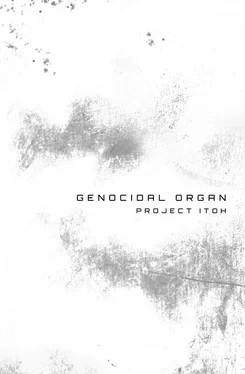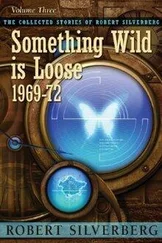Project Itoh - Genocidal Organ
Здесь есть возможность читать онлайн «Project Itoh - Genocidal Organ» весь текст электронной книги совершенно бесплатно (целиком полную версию без сокращений). В некоторых случаях можно слушать аудио, скачать через торрент в формате fb2 и присутствует краткое содержание. Год выпуска: 2012, ISBN: 2012, Издательство: Haikasoru/VIZ Media, Жанр: Старинная литература, на английском языке. Описание произведения, (предисловие) а так же отзывы посетителей доступны на портале библиотеки ЛибКат.
- Название:Genocidal Organ
- Автор:
- Издательство:Haikasoru/VIZ Media
- Жанр:
- Год:2012
- ISBN:9781421550886
- Рейтинг книги:4 / 5. Голосов: 1
-
Избранное:Добавить в избранное
- Отзывы:
-
Ваша оценка:
- 80
- 1
- 2
- 3
- 4
- 5
Genocidal Organ: краткое содержание, описание и аннотация
Предлагаем к чтению аннотацию, описание, краткое содержание или предисловие (зависит от того, что написал сам автор книги «Genocidal Organ»). Если вы не нашли необходимую информацию о книге — напишите в комментариях, мы постараемся отыскать её.
Genocidal Organ — читать онлайн бесплатно полную книгу (весь текст) целиком
Ниже представлен текст книги, разбитый по страницам. Система сохранения места последней прочитанной страницы, позволяет с удобством читать онлайн бесплатно книгу «Genocidal Organ», без необходимости каждый раз заново искать на чём Вы остановились. Поставьте закладку, и сможете в любой момент перейти на страницу, на которой закончили чтение.
Интервал:
Закладка:
“By no means. You can never escape from your own decisions. They are with you always.”
We walked on without rest.
All things considered, and taking a long-term historical perspective, the world was probably becoming a better place over time. The world did occasionally fall into the clutches of chaos and regressed, but broadly speaking the story of humanity was a story of progress. Relativism only gets you so far. There always comes a point where you can say that one culture has more sophisticated or enlightened values than another, and this can be a good thing in absolute terms. The story of civilization is the story of the battle of human conscience against the instinct to murder or rape or steal or betray, and how even against the harsh backdrop of the world, the conscience is still moving inexorably in the direction of altruism and love for family and friends and neighbors.
But we still have a long way to go before we can accurately describe ourselves as moral actors. As ethical beings.
For humans can turn our eyes from all sorts of things.
John Paul limped along behind me, desperately trying to keep pace. He was panting hard.
Now he asked me a question. “What about you? What will you do after this? Will you go back to assassinating people? To making the world a better place?”
“I’ve never been fighting to make the world a better place. I just did what I was ordered to do because they were my orders.”
“And is that all going to change now?”
“I don’t know,” I said honestly. “But what I do know is that I’m starting to see things a lot more clearly than before. At least I think I am.”
The jungle ended. Suddenly.
There was a clear sky that stretched out forever. Dawn was breaking, and a white horizon unfurled before us.
There was a Jeep parked up in the distance. It was still a little too far away to confirm with the naked eye, but it looked like there were two soldiers waiting there. According to our pre-mission briefing, these guys should be deployed from the Tanzanian army, here to help us.
I took a deep breath, and then John Paul and I started walking across the flat, grassy savanna.

A hollow, dry explosion echoed all around.
One of the soldiers in the distance was pointing a gun in our direction. I spun around. There was a small hole in John Paul’s forehead and he was lying on the ground.

“Welcome back, Captain Shepherd, sir! And congratulations on your successful mission.” One of our sergeants was there to welcome me—a black man, no doubt chosen for this mission because the color of his skin helped him blend in with the local African soldiers.
“What happened to Williams … ?” I asked absentmindedly.
“Killed in action, sir. According to a wireless transmission intercepted by an NSA team, sir.”
I was overcome by a fatigue that seemed to penetrate every last nook and cranny of my body. I felt like a lump of wax. As soon as I climbed into the Jeep and sat down I was assaulted by drowsiness. Williams, Lucia, John Paul. All were now distant, half-forgotten memories. The emotions that I thought I had felt and the insight that I thought I had gained—all seemed so unreal now. It was as if I could only remember the whole journey in a series of blurry low-resolution snapshots.
“Let’s get out of here.”
The Jeep started rolling. Moving gently toward the white horizon in the distance. For a moment I imagined that this Tanzanian savanna was the only place in the world that was real, that it stretched across the whole world, and that the Prague and the Paris and the Washington and the Georgetown that I knew were all just a bad dream—a nightmare called civilization.
Somewhere behind us in the vast savanna was John Paul’s final resting place. There his corpse would decay gently under the African sun. His sun-bleached body would be preserved for some time to come, and in this respect he was just like Mom, whom I’d had embalmed so that she would never rot away. John Paul, though, would eventually be able to return to the soil. Maybe the thought of that would have made him happy.

This is my story. That’s what I’m going to say once I’ve finished it.
I left the Forces. There was no one alive left to stop me. After returning from that last mission in Africa I felt that something inside me was missing. It took me a while to realize this for myself, and in the meantime many of my colleagues suggested various forms of counseling.
I brushed all the well-meaning suggestions aside. After my return to America I found that people were speaking in ways I found too fast and slippery. I found myself unable to fully participate in conversations. It was too difficult to join in, so I just stopped speaking to people.
One day, while I was holed up hermitlike in my house, doing nothing, I received an ID and a password in the post.
The envelope was embossed with an expensive-looking InfoSec company logo. It was the company my mother had subscribed to.
The envelope was addressed to me.
The sealed letter explained that, per the terms of the Fourth Amendment to the Personal Information Protection Law, when a person dies intestate and without specific instructions for the disposal of their subscription information assets, all accounts are embargoed for three years, and then all of the intestate party’s accounts are passed onto their next of kin as designated at the time of the opening of the account. As such, and the embargo now having passed, I was now the official owner of the information account of one Ms. Elyssia Shepherd (deceased).
In this society of ours, where everything is recorded and stored for posterity, you occasionally encounter this sort of blast from the past. It was a bit like being in a traffic accident—it’s not exactly a rare occurrence, but no one expects it to happen to them. I was no exception.
I didn’t believe that there would be anything my mother would have particularly wanted to share with me though. I was her next of kin by default; my father had already departed this world when she set up the account, and so I, her son and only child, was the default choice.
The sealed letter provided me with two potential pitfalls.
The first was my mother’s memories in and of themselves.
The second was the fact that, when I had to choose between my mother living or dying, I never put in a request to consult the memories.
When it had been medically determined that my mother was in a no man’s land between life and death and in a place that no living person would ever hope to experience or imagine, I could have put in an official request to the InfoSec company for permission to read her Life Graph. Both the law and the InfoSec company were able to grant special dispensation for a concerned third party to do so when the subscriber was unconscious or medically incapacitated.
I never put in the request. I just chose for my mother to die without reading her Life Graph.
I wonder why I had been afraid of reading my mother’s memories back then? I can’t remember exactly why anymore. All I remember is that I was vaguely frightened and that I didn’t want to.
What about now? Was I still afraid? I probably was. After experiencing the deaths of Lucia Sukrova and John Paul, however, it was now a different type of fear.
Читать дальшеИнтервал:
Закладка:
Похожие книги на «Genocidal Organ»
Представляем Вашему вниманию похожие книги на «Genocidal Organ» списком для выбора. Мы отобрали схожую по названию и смыслу литературу в надежде предоставить читателям больше вариантов отыскать новые, интересные, ещё непрочитанные произведения.
Обсуждение, отзывы о книге «Genocidal Organ» и просто собственные мнения читателей. Оставьте ваши комментарии, напишите, что Вы думаете о произведении, его смысле или главных героях. Укажите что конкретно понравилось, а что нет, и почему Вы так считаете.












